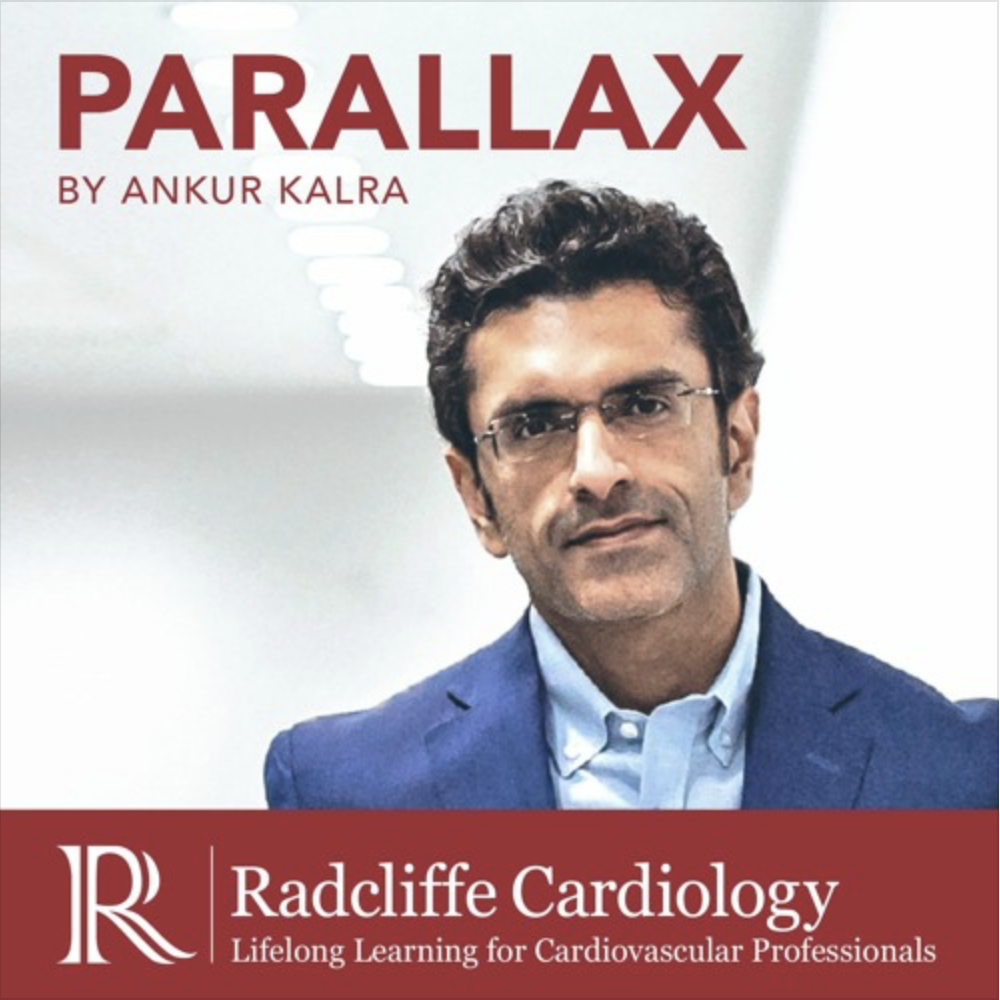
10: 2/3 Burnout & Resilience With Kavitha Chinnaiyan: How Mindfulness And The Ego Interact
What does mindfulness have to do with burnout? Is our definition of success driving our stress and anxiety? How can we channel our ego into something positive?
In our second episode on burnout and resilience, Kavitah Chinnaiyan, MD, and Ankur take a deeper dive into mindfulness and training the brain to move from Default-Mode to Task-Positive Networks. Kavitah is an award-winning author and, Cardiologist and Director of Cardiac CT Research at Beaumont Health, MI. Send us your thoughts to this episode for Ankur to share in future episodes: podcast@radciffe-group.com. Guest @ChinnaiyanMD.
Hosted by @AnkurKalraMD. Produced by @RadcliffeCARDIO.
Read MoreRead Less
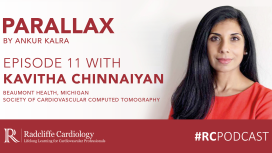
What are the key pillars of self-care and what do dirty windshields have to do with it? How can you take meditation “off the matt”? What has chronobiology and Ayurveda taught us about working with, rather than against, our circadian rhythm?
In the final episode of our burnout and resilience series, Kavitha and Ankur give you some practical tools of self-care to help you avoid burnout. Kavitah Chinnaiyan, MD, is an award-winning author and, Cardiologist and Director of Cardiac CT Research at Beaumont Health, MI. Send us your thoughts to this episode for Ankur to share in future episodes: podcast@radciffe-group.com. Guest @ChinnaiyanMD.
Hosted by @AnkurKalraMD. Produced by @RadcliffeCARDIO.
Read More
In the final episode of our burnout and resilience series, Kavitha and Ankur give you some practical tools of self-care to help you avoid burnout. Kavitah Chinnaiyan, MD, is an award-winning author and, Cardiologist and Director of Cardiac CT Research at Beaumont Health, MI. Send us your thoughts to this episode for Ankur to share in future episodes: podcast@radciffe-group.com. Guest @ChinnaiyanMD.
Hosted by @AnkurKalraMD. Produced by @RadcliffeCARDIO.
All Episodes

In this inspiring conversation, Dr Anavekar and Dr Kalra discuss the education of postgraduate medical students and reflect on Dr Anavekar’s role as a Program Director. Dr Anavekar shares his motivations and the moral framework he uses to approach his responsibility towards his students.
Read More

In this stimulating and thought-provoking episode, Dr. Kalra and Dr. Anavekar delve into the topic of measuring success in medicine. Dr. Anavekar puts forward the argument that the ambiguous definition of academic achievement often results in damaging biases that have long-term repercussions on the medical field. As a program director, Dr. Anavekar believes that the number of published articles should not be the only or most crucial criterion for evaluating early-career faculty. He argues that it's important to also consider the "distance travelled" by candidates. Dr. Kalra raises pertinent questions about the practical implications of this approach, and Dr. Anavekar provides candid insights into his responsibilities.
Read More

Dr Mahmoudi and Dr Täuber teamed up to explore bullying in academic settings. Together with Dr Kalra they discuss why bullies thrive in such environments and the ways institutions enable such behaviour. Dr Täuber offers solutions and a critical overview of institutional narratives, while Dr Mahmoudi highlights the long-term effects on academic work and medicine. They call for action against toxic behaviour and for stakeholders to eliminate incentives for universities to support perpetrators.
Read More

In 2018, the loss of a friend to suicide compelled Dr Anavekar to embark on a profound journey of contemplative self-exploration. Now, he uses his experience to encourage and guide trainees to pose thought-provoking questions that challenge the status quo of the materialistic approach to medicine, ultimately leading to a more outcome-focused perspective.
What is the Global Cardiology University project? How does Dr Anavekar encourage trainees to re-examine their role in patient care? What is his advice to our listeners?
Read More
What is the Global Cardiology University project? How does Dr Anavekar encourage trainees to re-examine their role in patient care? What is his advice to our listeners?

In the latest episode of Parallax, Dr. Ankur Kalra invites Dr Vijay Rao, the Governor of the Indiana Chapter of the American College of Cardiology, to share his experience and insights with the audience.
As Dr Kalra asks Dr Rao about the ways in which early career faculty members can get involved with the organization at a state level. Dr Rao shares his insider tips and highlights key events where individuals can further their participation.
How can you get involved with your local ACC chapter? How can you improve your leadership skills? What is Dr Rao’s advice for our listeners?
Read More
As Dr Kalra asks Dr Rao about the ways in which early career faculty members can get involved with the organization at a state level. Dr Rao shares his insider tips and highlights key events where individuals can further their participation.
How can you get involved with your local ACC chapter? How can you improve your leadership skills? What is Dr Rao’s advice for our listeners?

Dr Vuyisich shares his personal journey with rheumatoid arthritis and how it led him to explore the intersection of nutrition and the gut microbiome function.
He explains how the complexity of nutrition and the compounds generated by the gut microbiome can impact our health. We learn more about three compounds produced by our gut microbiome that have a strong connection with heart disease.
Through this conversation, Dr Vuyisich invites us to reframe our approach to nutrition and prevention as a question of food education and data-driven science.
Read More
He explains how the complexity of nutrition and the compounds generated by the gut microbiome can impact our health. We learn more about three compounds produced by our gut microbiome that have a strong connection with heart disease.
Through this conversation, Dr Vuyisich invites us to reframe our approach to nutrition and prevention as a question of food education and data-driven science.

In this week’s Parallax Dr Kalra welcomes back Dr Nijjer for their annual review of the most impactful and controversial cardiovascular trials of 2022.
Read More

Neurocardiology refers to the intersection between the fields of neurology and cardiology. The mind and heart are deeply interconnected in terms of anatomy, physiology, and various pathologic states.
This episode features a vascular neurologist and an interventional cardiologist who will discuss the relationship between their two fields of medicine.
Read More
This episode features a vascular neurologist and an interventional cardiologist who will discuss the relationship between their two fields of medicine.

Coming from generations of doctors, Dr Kittleson describes herself first and foremost a dedicated clinician. With her new book, Dr Kittleson offers her mentorship and shares her advice on how to make patient care fulfilling for both clinicians and patients.
In this rich and insightful discussion, Dr Kittleson talks about the origins of famous #kittlesonrules, a collection of tips for doctors shared on Twitter, and her thoughts on mentorship. We learn more about Mastering the Art of Patient Care. Dr Kalra and Dr Kittleson discuss strategies for managing difficult situations in patient care.
Read More
In this rich and insightful discussion, Dr Kittleson talks about the origins of famous #kittlesonrules, a collection of tips for doctors shared on Twitter, and her thoughts on mentorship. We learn more about Mastering the Art of Patient Care. Dr Kalra and Dr Kittleson discuss strategies for managing difficult situations in patient care.

Dr Lawrence Huntoon, Editor-in-Chief of the Journal of the Association of American Physicians and Surgeons, returns for a deep dive into the topic of the hospital peer review system.
What do you need to know about hospital investigations? What is the difference between OPPE and FPPE? How can you get educated on hospital bylaws and processes?
Read More
What do you need to know about hospital investigations? What is the difference between OPPE and FPPE? How can you get educated on hospital bylaws and processes?
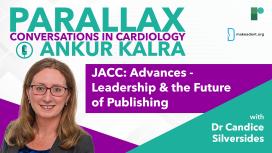
Dive into the unique synergy between her clinical practice and editorial leadership as Dr Silversides shares her vision for the journal. Learn how she navigates diverse responsibilities, manages peer reviews, and ensures fair evaluation of the submitted manuscripts. Get insights into launching a journal, from adapting to the needs of the readership and editorial board selection to time management. Dr Silversides joins Dr Kalra in exploring the evolving landscape of academic publishing, discussing the challenges and opportunities presented by AI and other advancements.
Read More
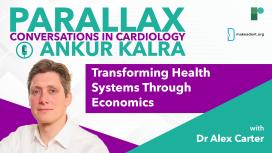
The podcast embarks on an exploration of the program's three fundamental pillars: health economics, outcomes measurement, and management. Dr. Carter underscores the importance of efficiently allocating scarce resources, evaluating health system performance through population outcomes, and translating theoretical knowledge into practical application through leadership.
Read More
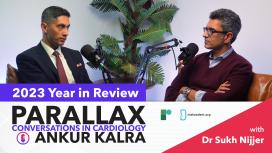
Dr Ankur Kalra welcomes back Dr Sukhjinder Nijjer for their much-anticipated annual review of advancements in cardiovascular medicine that defined the year 2023.
Read More
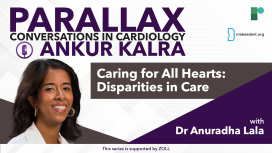
In this thought-provoking episode, Dr Ankur Kalra is joined by Dr Anuradha Lala. They delve into the critical topic of disparities in care within the healthcare system from a cardiologist's point of view and explore actionable steps towards a more inclusive and fair healthcare landscape.
This series is supported by ZOLL and is intended for Health Care Professionals.
Read More
This series is supported by ZOLL and is intended for Health Care Professionals.
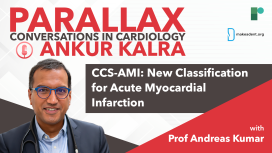
In this informative episode, Dr Kumar shares what led his team and the CCS to introduce a new classification scheme for acute MI. He discusses how research from the past 15 years highlighted the need to incorporate tissue changes resulting from acute myocardial infarction (MI) into clinical practice. Dr Kumar outlines the four stages of CCS-AMI, and we gain insight into how this novel classification scheme could impact bedside medicine.
Read More





